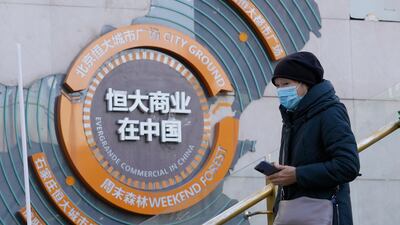Fitch Ratings downgraded indebted Evergrande Group and its subsidiaries on Thursday and declared them as defaulters, as the grace period to make two coupon payments expired on Monday.
Fitch cut the developer's ratings to restricted default (RD) and said the company didn’t make any announcements or respond to a request seeking confirmation on the coupon payments, and it thus assumes payment was not made, the ratings agency said in a statement on Thursday. Evergrande, China's second-largest property company by sales, has more than $300 billion of debt and is considered the world’s most indebted developer.
The ratings were cut from 'C' and impact China Evergrande Group and its subsidiaries, Hengda Real Estate Group and Tianji Holding, even though there has been no initiation of bankruptcy filings, administration, receivership, liquidation, or other formal winding-up procedures, Fitch said.
"The downgrades reflect the non-payment of coupons due November 6, 2021 for Tianji's $645 million 13 per cent bonds and $590 million 13.75 per cent bonds after the grace period lapsed on December 6," Fitch said.
"The non-payment is consistent with an 'RD' rating, signifying the uncured expiry of any applicable grace period, cure period or default forbearance period following a payment default on a material financial obligation."
On December 3, Evergrande's chairman Hui Ka Yan issued a statement and said given the company's liquidity crunch, there was no guarantee the developer will have sufficient funds to continue to perform its financial obligations and would be looking to restructure.
"The group is taking a comprehensive view in assessing its overall financial condition, considering the interests of all stakeholders, upholding the principles of fairness and legality, and plans to actively engage with offshore creditors to formulate a viable restructuring plan of the company’s offshore indebtedness for the benefit of all stakeholders," Mr Hui said.
Shenzhen-based Evergrande owns more than 1,300 projects in 280 or more cities in China, according to its website. Its Hong Kong-listed property services arm has about 2,800 projects in more than 310 cities in China. The company also has businesses in electric vehicles, finance, healthcare and cultural tourism.
Fitch's analysis assumes Evergrande would be liquidated in a bankruptcy because it is an asset-trading company. The rating agency also assumes both Hengda and Evergrande would go into bankruptcy if Evergrande defaults.
Evergrande bondholders said they expect offshore creditors to be near the bottom of the queue for repayment and some offshore creditors are already consulting with financial and legal advisers, according to Bloomberg.
Ashmore Group, BlackRock, FIL, UBS and Allianz have all reported holding Evergrande debt, according to Bloomberg data.
China's $15 trillion economy accounts for about 18 per cent of global output and most analysts still believe the government will intervene to cushion the impact of Evergrande's debt crisis.
In September, Evergrande agreed to sell a 20 per cent stake in Shengjing Bank to the local Shenyang government for 10 billion yuan ($1.55bn). All proceeds must go towards settling debts with the lender, according to the statement at the time.


